东西方宗教文化差异(英文版)
- 格式:ppt
- 大小:1.13 MB
- 文档页数:16
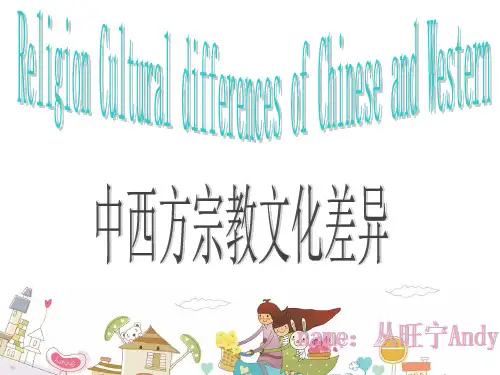
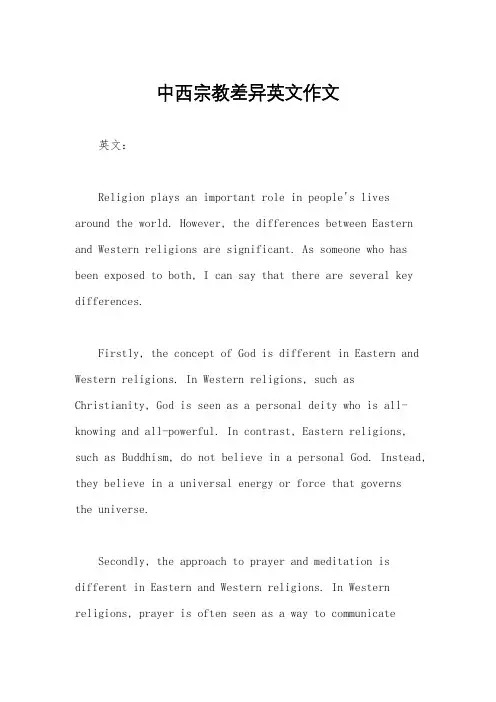
中西宗教差异英文作文英文:Religion plays an important role in people's lives around the world. However, the differences between Eastern and Western religions are significant. As someone who has been exposed to both, I can say that there are several key differences.Firstly, the concept of God is different in Eastern and Western religions. In Western religions, such as Christianity, God is seen as a personal deity who is all-knowing and all-powerful. In contrast, Eastern religions, such as Buddhism, do not believe in a personal God. Instead, they believe in a universal energy or force that governsthe universe.Secondly, the approach to prayer and meditation is different in Eastern and Western religions. In Western religions, prayer is often seen as a way to communicatewith God and ask for guidance or blessings. In contrast, meditation is more commonly practiced in Eastern religions as a way to quiet the mind and achieve inner peace.Thirdly, the role of the individual is different in Eastern and Western religions. In Western religions, individuals are often seen as separate from God and in need of salvation. In contrast, Eastern religions emphasize the interconnectedness of all beings and the importance of achieving enlightenment or liberation from suffering.In terms of examples, one can look at the differences between Christmas and the Chinese New Year. Christmas is a Christian holiday that celebrates the birth of Jesus Christ, while the Chinese New Year is a celebration of the lunar new year and is rooted in Chinese traditions and beliefs. Another example is the difference between the Western concept of heaven and the Eastern concept of reincarnation.中文:宗教在全世界的人们生活中扮演着重要的角色。
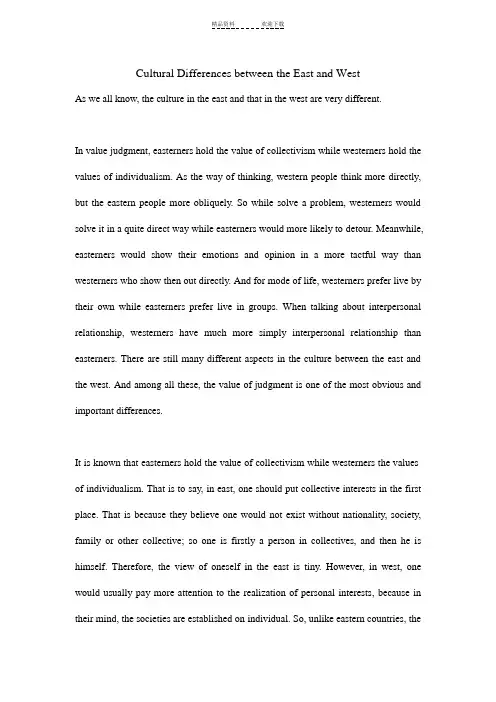
Cultural Differences between the East and WestAs we all know, the culture in the east and that in the west are very different.In value judgment, easterners hold the value of collectivism while westerners hold the values of individualism. As the way of thinking, western people think more directly, but the eastern people more obliquely. So while solve a problem, westerners would solve it in a quite direct way while easterners would more likely to detour. Meanwhile, easterners would show their emotions and opinion in a more tactful way than westerners who show then out directly. And for mode of life, westerners prefer live by their own while easterners prefer live in groups. When talking about interpersonal relationship, westerners have much more simply interpersonal relationship than easterners. There are still many different aspects in the culture between the east and the west. And among all these, the value of judgment is one of the most obvious and important differences.It is known that easterners hold the value of collectivism while westerners the values of individualism. That is to say, in east, one should put collective interests in the first place. That is because they believe one would not exist without nationality, society, family or other collective; so one is firstly a person in collectives, and then he is himself. Therefore, the view of oneself in the east is tiny. However, in west, one would usually pay more attention to the realization of personal interests, because in their mind, the societies are established on individual. So, unlike eastern countries, theview of self is great in western countries.In the past years, millions of people argue that the collectivism and individualism which one is better. They all had their own points, and as for me, they are all reasonable. In one hand, any one of us is living in the collective, on one can live without collective; and as a member of a collective, it is reasonable and necessary to attach importance to the congregate interests. But it does not necessary mean that we should give up all our rational interests, we still have the rights to pursue them. Only when our own interest against the congregate one, should we put the congregate one in the first place. In the other hand, it is right for the individualism stress the expression of individuality, independence, liberty, competition, and self-achievement.A society should admit individual value, so that, the whole society could exert its vitality absolutely. In a word, from my point of view, these two types of value are all meaningful and have their own pros.There are many differences between east and west. Different cultures add a colorful element to the world. The cultural gap should not be the obstacle to the civilization of human being. It ought to be the motivation of our going farther. Besides, we can not judge which type of culture is better in our own point of view, because all culture exits in its meaningful way: they formed, developed and exited in a specific culture and social environment.。
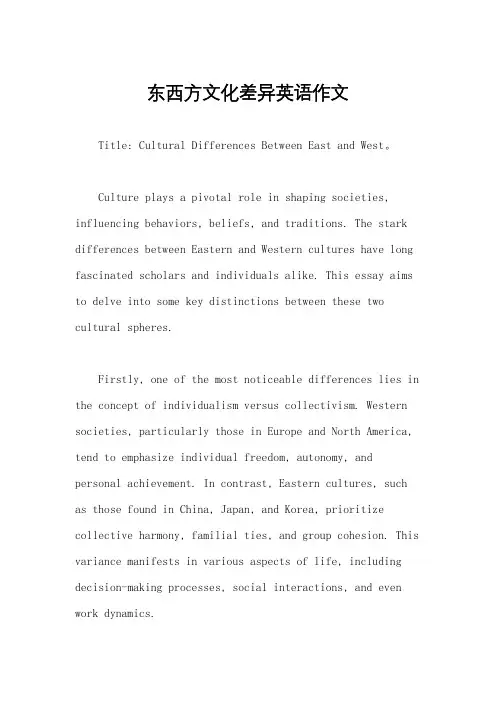
东西方文化差异英语作文Title: Cultural Differences Between East and West。
Culture plays a pivotal role in shaping societies, influencing behaviors, beliefs, and traditions. The stark differences between Eastern and Western cultures have long fascinated scholars and individuals alike. This essay aims to delve into some key distinctions between these two cultural spheres.Firstly, one of the most noticeable differences lies in the concept of individualism versus collectivism. Western societies, particularly those in Europe and North America, tend to emphasize individual freedom, autonomy, and personal achievement. In contrast, Eastern cultures, such as those found in China, Japan, and Korea, prioritize collective harmony, familial ties, and group cohesion. This variance manifests in various aspects of life, including decision-making processes, social interactions, and even work dynamics.For instance, in Western cultures, individuals are encouraged to express their opinions, pursue personal goals, and assert their independence. This emphasis onindividualism can be observed in educational settings,where students are encouraged to think critically,challenge authority, and showcase their unique talents. Moreover, in professional environments, employees often strive for personal recognition, career advancement, and individual success.Conversely, Eastern cultures value conformity, humility, and maintaining social harmony. In educational settings, students are expected to respect authority, cooperate with peers, and prioritize the collective good over individual achievements. Similarly, in the workplace, teamwork,loyalty to the organization, and consensus-building are highly valued traits. The hierarchical structure prevalentin many Eastern societies reinforces the importance of deference to authority and adherence to traditional norms.Another notable distinction is the perception of time.Western cultures typically adhere to a linear view of time, where schedules are meticulously planned, and punctuality is highly valued. Time is often equated with money, and efficiency is prioritized in various facets of life, including work, education, and social engagements.On the contrary, Eastern cultures often adopt a more cyclical view of time, where events unfold organically, and the emphasis is placed on the present moment rather than strict adherence to schedules. This can be observed in cultural practices such as tea ceremonies in Japan or leisurely family gatherings in China, where the focus is on savoring the moment rather than rushing through it.Moreover, communication styles vary significantly between Eastern and Western cultures. Western communication tends to be direct, explicit, and assertive, with individuals encouraged to speak their minds openly and express their opinions freely. This directness is valuedfor its clarity and efficiency in conveying information and resolving conflicts.In contrast, Eastern communication is often characterized by indirectness, implicitness, and the use of context cues. Silence, nonverbal cues, and subtle gestures play crucial roles in conveying messages, maintaining harmony, and preserving interpersonal relationships. Additionally, saving face and avoiding confrontation are paramount in many Eastern cultures, leading to a preference for diplomacy and tactful communication strategies.Furthermore, the perception of authority and leadership differs between East and West. Western societies tend to favor democratic leadership styles that prioritize equality, participatory decision-making, and individual empowerment. Leaders are expected to consult with their subordinates, solicit feedback, and foster a sense of inclusivity within the organization.In contrast, Eastern cultures often value hierarchical leadership structures, where authority is centralized, and obedience to superiors is emphasized. Leaders are reveredfor their wisdom, experience, and benevolence, and subordinates are expected to defer to their judgmentwithout question. This hierarchical approach fosters stability, order, and respect for authority within organizations and society at large.In conclusion, while both Eastern and Western cultures share common human values and aspirations, their approaches to various aspects of life diverge significantly. Understanding these cultural differences is crucial for fostering mutual respect, cross-cultural communication, and global cooperation in an increasingly interconnected world. By appreciating and embracing the richness of diversity, we can bridge the gap between East and West and cultivate a more harmonious and inclusive global community.。
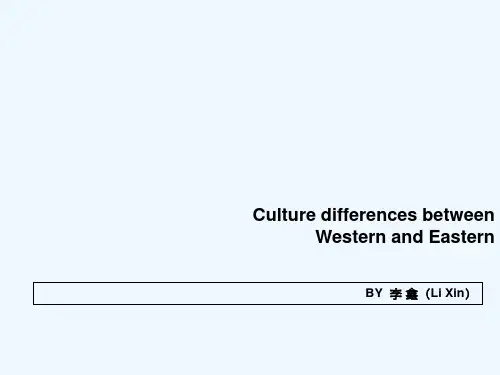
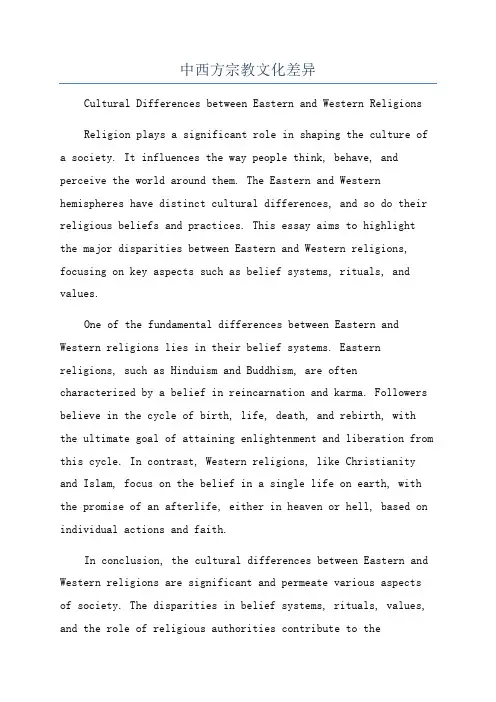
中西方宗教文化差异Cultural Differences between Eastern and Western ReligionsReligion plays a significant role in shaping the culture of a society. It influences the way people think, behave, and perceive the world around them. The Eastern and Western hemispheres have distinct cultural differences, and so do their religious beliefs and practices. This essay aims to highlight the major disparities between Eastern and Western religions, focusing on key aspects such as belief systems, rituals, and values.One of the fundamental differences between Eastern and Western religions lies in their belief systems. Eastern religions, such as Hinduism and Buddhism, are often characterized by a belief in reincarnation and karma. Followers believe in the cycle of birth, life, death, and rebirth, with the ultimate goal of attaining enlightenment and liberation from this cycle. In contrast, Western religions, like Christianity and Islam, focus on the belief in a single life on earth, with the promise of an afterlife, either in heaven or hell, based on individual actions and faith.In conclusion, the cultural differences between Eastern and Western religions are significant and permeate various aspects of society. The disparities in belief systems, rituals, values, and the role of religious authorities contribute to thedistinctiveness of each religious tradition. Understanding these differences is crucial in promoting intercultural dialogue, fostering mutual respect, and appreciating the diversity of religious beliefs and practices in our globalized world.。
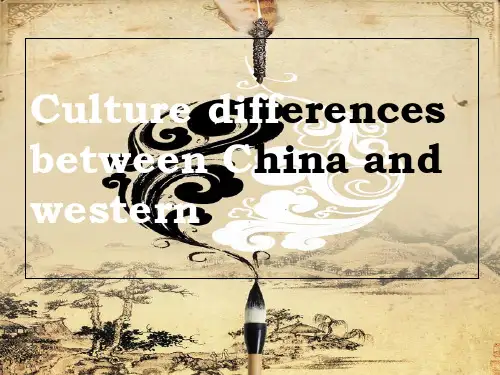

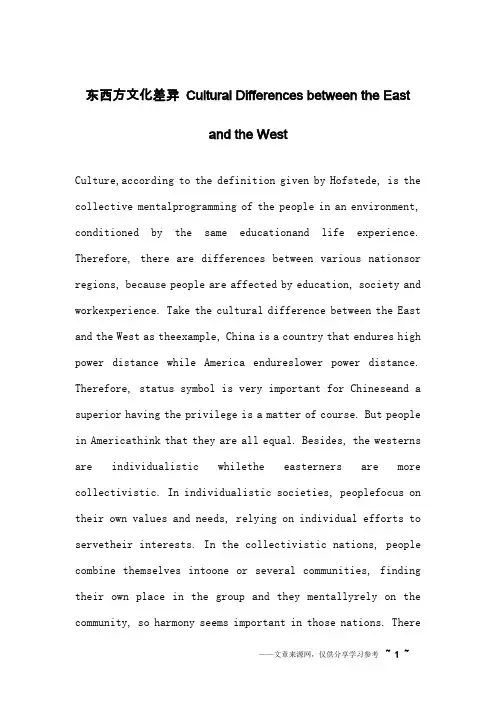
东西方文化差异Cultural Differences between the Eastand the WestCulture,according to the definition given by Hofstede, is the collective mentalprogramming of the people in an environment, conditioned by the same educationand life experience. Therefore, there are differences between various nationsor regions, because people are affected by education, society and workexperience. Take the cultural difference between the East and the West as theexample, China is a country that endures high power distance while America endureslower power distance. Therefore, status symbol is very important for Chineseand a superior having the privilege is a matter of course. But people in Americathink that they are all equal. Besides, the westerns are individualistic whilethe easterners are more collectivistic. In individualistic societies, peoplefocus on their own values and needs, relying on individual efforts to servetheir interests. In the collectivistic nations, people combine themselves intoone or several communities, finding their own place in the group and they mentallyrely on the community, so harmony seems important in those nations. Thereare threemain differences between the East and the West, namely uncertainty avoidanceindex, masculine versus femininity and long vs. short term orientation.根据霍夫斯泰德对文化所下的定义,文化是在同一个环境中的人们所具有的“共同的心理程序”,是由相同的教育背景和生活经历所决定的。
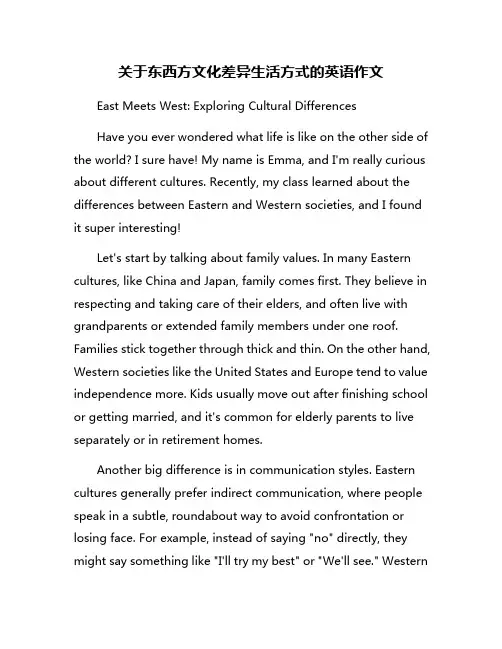
关于东西方文化差异生活方式的英语作文East Meets West: Exploring Cultural DifferencesHave you ever wondered what life is like on the other side of the world? I sure have! My name is Emma, and I'm really curious about different cultures. Recently, my class learned about the differences between Eastern and Western societies, and I found it super interesting!Let's start by talking about family values. In many Eastern cultures, like China and Japan, family comes first. They believe in respecting and taking care of their elders, and often live with grandparents or extended family members under one roof. Families stick together through thick and thin. On the other hand, Western societies like the United States and Europe tend to value independence more. Kids usually move out after finishing school or getting married, and it's common for elderly parents to live separately or in retirement homes.Another big difference is in communication styles. Eastern cultures generally prefer indirect communication, where people speak in a subtle, roundabout way to avoid confrontation or losing face. For example, instead of saying "no" directly, they might say something like "I'll try my best" or "We'll see." Westerncultures, on the other hand, tend to be more direct and straightforward in their communication.Let's talk about food next – one of my favorite topics! Eastern cuisine often includes rice as a staple, along with lots of vegetables, seafood, and soy-based products like tofu. They also use chopsticks for eating. Western diets, meanwhile, are more centered around bread, meat, and dairy products. They typically use forks, knives, and spoons for eating.Speaking of food, table manners are quite different too. In many Eastern cultures, it's considered polite to slurp your noodles or soup loudly, as it shows you're enjoying the meal. But in Western cultures, loud slurping is seen as rude and impolite. Isn't that interesting?Another cool difference is in clothing and fashion. Traditional Eastern attire, like kimonos in Japan or saris in India, are often loose and flowing, with intricate designs and bright colors. Western fashion, on the other hand, tends to be more form-fitting and understated, with classic styles like jeans andt-shirts being popular.Now, let's talk about celebrations and holidays. Many Eastern festivals are based on lunar calendars and have deep connections to nature, like the Chinese New Year or the JapaneseCherry Blossom Festival. Western holidays, like Christmas and Easter, often have religious origins and are more tied to specific dates on the solar calendar.Ah, and we can't forget about education! In many Eastern societies, education is highly valued and seen as the key to success. Students often attend extra tutoring sessions and cram schools, and there's a lot of emphasis on academic achievement and test scores. Western education systems, while still valuing education, tend to focus more on well-rounded development, with a balance between academics, sports, and extracurricular activities.Lastly, let's talk about the concept of time. Eastern cultures generally have a more flexible and fluid approach to time, where being a little late is often acceptable. Life moves at a slower, more relaxed pace. Western societies, on the other hand, tend to be more punctual and time-oriented, with a greater emphasis on schedules and deadlines.Phew, that's a lot of differences! But you know what? Despite all these contrasts, I think there's beauty in diversity. Learning about other cultures helps us appreciate the richness of our world and become more understanding and open-minded.At the end of the day, we're all human beings, sharing this planet together. Sure, we might have different ways of doing things, but deep down, we all want happiness, love, and a fulfilling life. By embracing our differences and learning from each other, we can create a more connected and compassionate world.So, the next time you encounter someone from a different cultural background, remember to keep an open mind and a curious heart. Ask questions, share stories, and find common ground. Who knows, you might just make a new friend and learn something amazing in the process!。
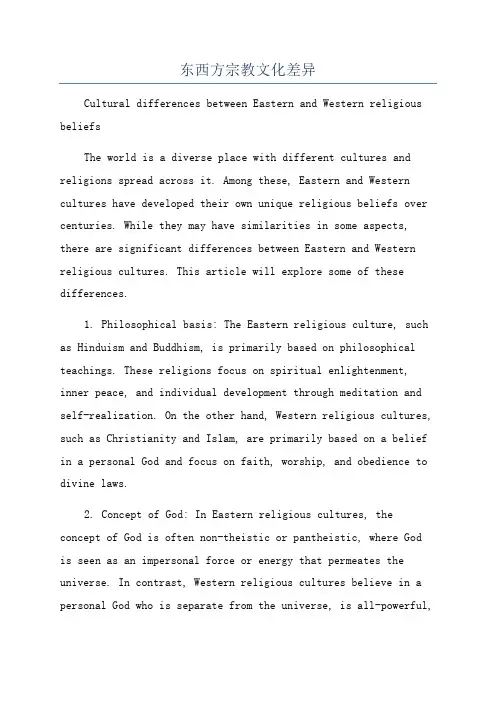
东西方宗教文化差异Cultural differences between Eastern and Western religious beliefsThe world is a diverse place with different cultures and religions spread across it. Among these, Eastern and Western cultures have developed their own unique religious beliefs over centuries. While they may have similarities in some aspects, there are significant differences between Eastern and Western religious cultures. This article will explore some of these differences.1. Philosophical basis: The Eastern religious culture, such as Hinduism and Buddhism, is primarily based on philosophical teachings. These religions focus on spiritual enlightenment, inner peace, and individual development through meditation and self-realization. On the other hand, Western religious cultures, such as Christianity and Islam, are primarily based on a belief in a personal God and focus on faith, worship, and obedience to divine laws.2. Concept of God: In Eastern religious cultures, the concept of God is often non-theistic or pantheistic, where God is seen as an impersonal force or energy that permeates the universe. In contrast, Western religious cultures believe in a personal God who is separate from the universe, is all-powerful,and often interacts with humans through revelations, miracles, and prayers.5. Role of spirituality: Eastern religious cultures emphasize the role of spirituality in daily life, with practices like meditation, yoga, and mindfulness being integral to one's well-being. These practices help individuals to achieve self-realization and transcendence. In contrast, Western religious cultures often view spirituality as separate from everyday life, with a focus on attending religious services, following moral codes, and participating in religious rituals on specific occasions.6. Approach to authority: Eastern religious cultures often have a more flexible approach towards religious authority, with individuals having the freedom to interpret and adapt teachings based on personal understanding and experience. Westernreligious cultures, especially organized religions like Christianity, have a more structured and centralized approach, where religious teachings are often based on authoritative texts and interpreted by religious leaders.In conclusion, the differences between Eastern and Western religious cultures arise from their differing philosophical foundations, beliefs about God, worship practices, views on the afterlife, role of spirituality, and approach to authority. While these differences create unique identities for eachculture, it is important to recognize and respect the diversity, as it contributes to the richness and variety of human existence.。
谈谈中西方文化差异用英语写作文英文回答:Cultural differences between the East and the West are a fascinating area of study, as they shed light on the diverse ways in which human societies have evolved and organized themselves. While there are countless aspects that distinguish Eastern and Western cultures, some of the most fundamental differences lie in their values, beliefs, and social norms.Values:One of the most striking differences between Eastern and Western cultures is their differing sets of values. In the East, collectivism and harmony are paramount, while in the West, individualism and autonomy are highly valued. Eastern cultures emphasize the importance of fitting into the group and maintaining social cohesion, whereas Western cultures encourage individuals to pursue their own goalsand desires.Beliefs:Another fundamental difference lies in the religious beliefs and spiritual practices that prevail in each region. Eastern cultures are heavily influenced by Easternreligions such as Buddhism, Confucianism, and Taoism, which emphasize concepts of karma, reincarnation, and the interconnectedness of all things. Western cultures, on the other hand, are rooted in the Judeo-Christian tradition, which places a strong emphasis on monotheism, personal salvation, and the separation between humans and God.Social Norms:The social norms and customs that shape daily life in Eastern and Western cultures also differ significantly. In the East, there is a strong emphasis on respect for authority, hierarchy, and tradition. Individuals are expected to conform to social expectations and avoidcausing shame to their family or community. In the West,social norms are more egalitarian, and individuals are encouraged to question authority and express their own viewpoints.Communication:Communication styles also vary between Eastern and Western cultures. In the East, communication tends to be indirect and implicit, with a focus on non-verbal cues and subtle hints. In the West, communication is often more direct and explicit, with a strong emphasis on clarity and efficiency.Time Perception:Another notable difference is in the way that Eastern and Western cultures perceive time. Eastern cultures tend to view time as cyclical and fluid, while Western cultures view it as linear and finite. This difference can manifest in various aspects of life, such as attitudes toward work, leisure, and personal relationships.These are just a few examples of the countless cultural differences that exist between the East and the West. These differences shape everything from the way that people interact with each other to the way that they view theworld around them. Recognizing and understanding these differences is crucial for fostering mutual respect and cooperation between cultures.中文回答:文化差异。
中西宗教差异英文作文In the West, Christianity is the dominant religion, with a belief in one God and the teachings of Jesus Christ. It emphasizes the concepts of sin, redemption, and salvation, with a focus on faith and the afterlife.In contrast, in the East, Buddhism and Hinduism are the predominant religions. Buddhism teaches the path to enlightenment through the Four Noble Truths and the Eightfold Path, while Hinduism emphasizes the cycle of birth, death, and rebirth (reincarnation) and the pursuit of dharma (duty) and moksha (liberation).Christianity places a strong emphasis on the individual relationship with God and the need for repentance and forgiveness. In contrast, Eastern religions often focus on the interconnectedness of all things and the idea of karma, the law of cause and effect.In Western religious practices, prayer and worship areoften conducted in churches, with a focus on communal gatherings and rituals. In Eastern religions, temples and shrines are common places of worship, and individual meditation and personal spiritual practices are often emphasized.The religious texts of Christianity, such as the Bible, are considered to be the word of God and are central to the faith. In Eastern religions, there are a variety of sacred texts and teachings, such as the Vedas and the Tripitaka, which are studied and revered by followers.In the West, religious holidays such as Christmas and Easter are widely celebrated, often with a focus on family gatherings and traditions. In the East, festivals such as Diwali and Vesak are important, often involving colorful rituals, feasting, and acts of charity.。